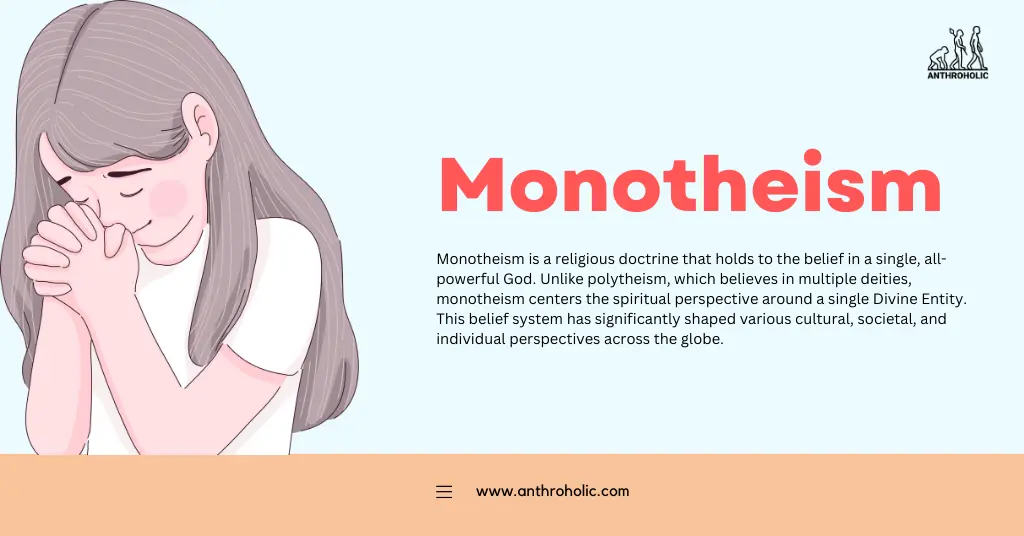AI Answer Evaluation Platform Live Now. Try Free Answer Evaluation Now
Monotheism
Monotheism is a religious doctrine that holds to the belief in a single, all-powerful God. Unlike polytheism, which believes in multiple deities, monotheism centers the spiritual perspective around a single Divine Entity [1]. This belief system has significantly shaped various cultural, societal, and individual perspectives across the globe.

Origin and Historical Context
Monotheism as a religious belief emerged in various cultures around the world. However, the earliest recorded evidence of a monotheistic religion dates back to the 14th Century BCE in Ancient Egypt, during the reign of the Pharaoh Akhenaten [2].
Akhenaten and Atenism
In an unprecedented move, Pharaoh Akhenaten moved away from traditional Egyptian polytheism, elevating the sun god Aten above all others and arguably declaring him the only god [3].
The Abrahamic Faiths
After Atenism, the next major manifestation of monotheism is observed within the Abrahamic faiths – Judaism, Christianity, and Islam, which rose several centuries later.
- Judaism: Originating around the 2nd millennium BCE, Judaism is considered one of the oldest monotheistic religions. It centers around the worship of Yahweh, the God of Abraham [4].
- Christianity: Emerging in the 1st Century CE, Christianity upholds monotheism by acknowledging one God who manifests in three persons: the Father, the Son (Jesus Christ), and the Holy Spirit [5].
- Islam: The youngest of the Abrahamic faiths, Islam, originating in the 7th Century CE, holds a strict monotheistic stance, declaring that “There is no god but Allah” [6].
| Religion | Origin (Approx.) | Deity |
|---|---|---|
| Judaism | 2nd millennium BCE | Yahweh |
| Christianity | 1st Century CE | God (Father, Son, Holy Spirit) |
| Islam | 7th Century CE | Allah |
Impact on Society
Monotheism has dramatically impacted society in numerous ways.
- Moral and Ethical Guidelines: Monotheistic religions often come with a set of moral and ethical guidelines that form the societal norms and laws [7].
- Cultural Influences: Monotheism has played a crucial role in shaping cultures, from influencing art and architecture to dictating societal hierarchies and behaviors [8].
- Political Impact: Kings and leaders have often claimed divine right, drawing authority from a singular God. This has significantly impacted political systems and power structures [9].
Critiques of Monotheism
While monotheism has been influential, it has not been without its critiques. The major critiques include:
- Exclusivity: Monotheism can foster a sense of exclusivity and intolerance towards polytheistic religions or other belief systems [10].
- Problem of Evil: The existence of a single all-powerful and benevolent God raises questions about the presence of evil and suffering in the world [11].
Monotheism and Science
The emergence of modern science has presented both challenges and opportunities for monotheistic faiths.
Challenges
Monotheistic religions, like all faith systems, have had to grapple with the scientific revolution. This has manifested in two key areas:
- Cosmology: The advancement of cosmology, including the theory of the Big Bang, has raised questions about traditional religious narratives concerning the creation of the universe [12].
- Evolution: The theory of evolution, most notably proposed by Charles Darwin, has challenged literal interpretations of religious texts about the origins of human life [13].
Opportunities
Despite these challenges, many see an opportunity for reconciliation between monotheism and science. The fine-tuning argument, for example, posits that the precise physical constants of the universe suggest a purposeful design compatible with a monotheistic Creator [14].
Monotheism in a Pluralistic Society
As our society becomes more diverse and interconnected, understanding and respecting various belief systems, including monotheism, is essential. It’s crucial to promote interfaith dialogues and education to foster mutual respect and coexistence [15].
| Tolerance Practices | Description |
|---|---|
| Interfaith Dialogue | Encourages discussions between different faiths to promote understanding and respect |
| Religious Education | Equips individuals with knowledge about different belief systems |
| Community Engagement | Promotes shared community activities that transcend religious boundaries |
Conclusion
Monotheism, despite its critiques, continues to be a dominant religious belief system. It shapes societies, cultures, and individual lives, providing a framework for understanding the universe’s origins and purpose. As we move forward, the dialogue between monotheism and other belief systems will continue to evolve, enriching our understanding of human spirituality and existence.
References
[1] Muesse, M. (2011). The Age of the Sages: The Axial Age in Asia and the Near East. Minneapolis: Fortress Press.
[2] Redford, D. (1987). Akhenaten: The Heretic King. Princeton: Princeton University Press.
[3] Hornung, E. (1999). Akhenaten and the Religion of Light. Ithaca: Cornell University Press.
[4] Levine, L. I. (2000). Judaism: Continuity and Change. Oxford: Oxford University Press.
[5] McGrath, A. E. (2011). Christianity: An Introduction. Wiley-Blackwell.
[6] Esposito, J. (2002). What Everyone Needs to Know about Islam. Oxford: Oxford University Press.
[7] Novak, D. (2005). The Jewish Social Contract: An Essay in Political Theology. Princeton: Princeton University Press.
[8] Armstrong, K. (2000). Islam: A Short History. Modern Library.
[9] Kantorowicz, E. (1957). The King’s Two Bodies: A Study in Medieval Political Theology. Princeton: Princeton University Press.
[10] Pals, D. (1996). Seven Theories of Religion. New York: Oxford University Press.
[11] Dostoevsky, F. (2002). The Brothers Karamazov. Farrar, Straus and Giroux.
[12] Hawking, S. (1988). A Brief History of Time. Bantam Books.
[13] Darwin, C. (1859). On the Origin of Species. John Murray.
[14] Collins, F. (2006). The Language of God: A Scientist Presents Evidence for Belief. Free Press.
[15] Eck, D. L. (2001). A New Religious America: How a “Christian Country” Has Become the World’s Most Religiously Diverse Nation. HarperOne.




